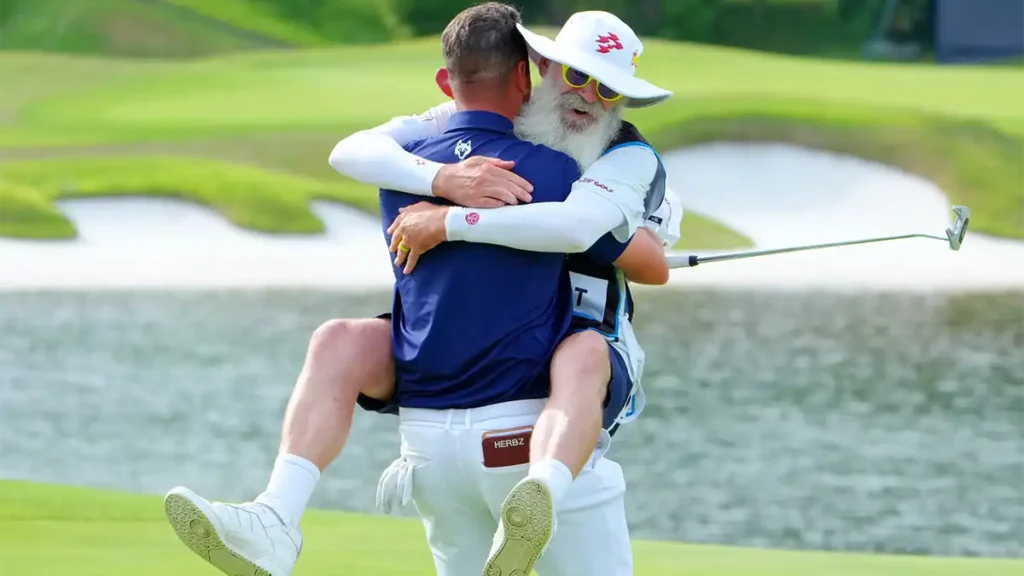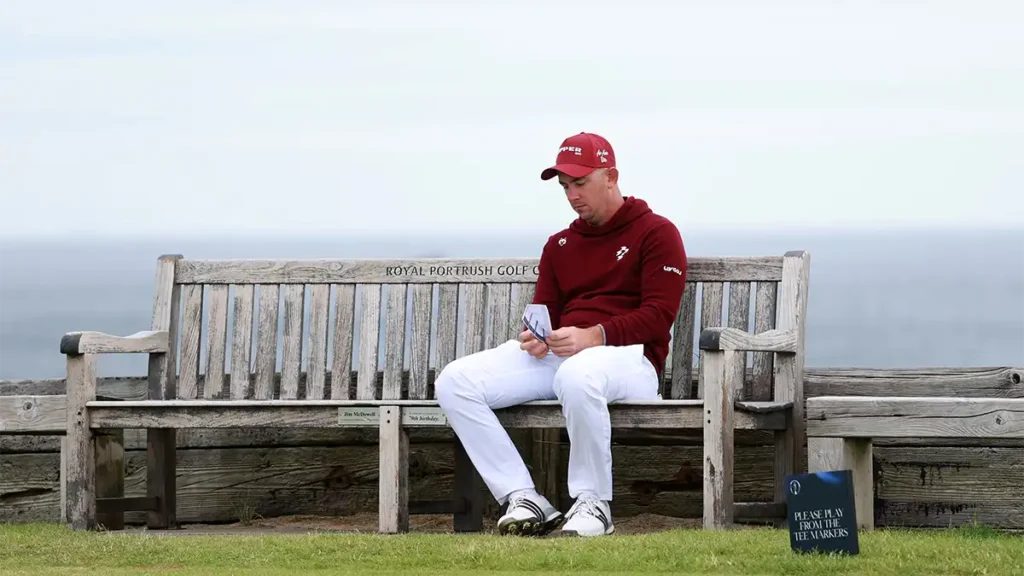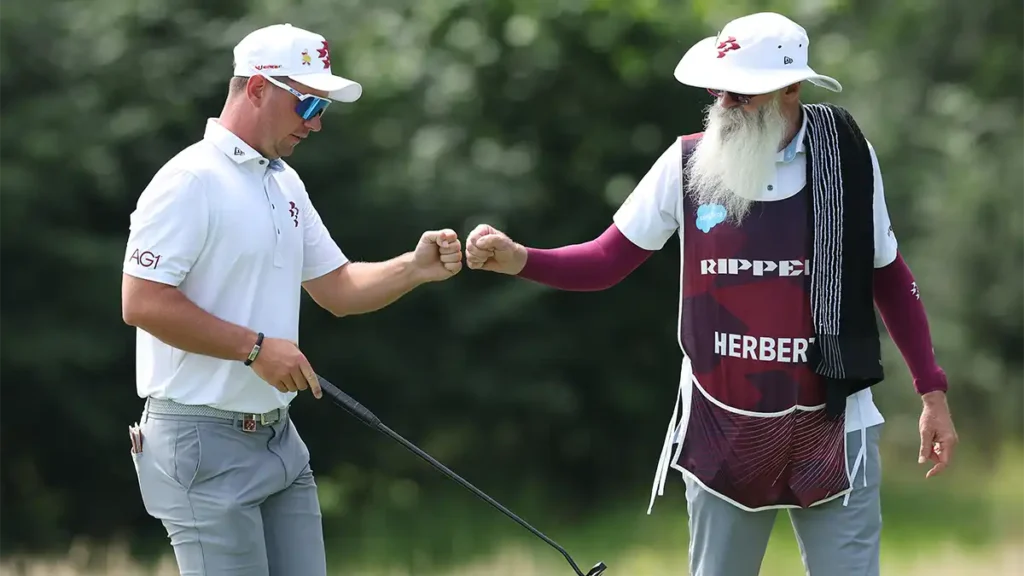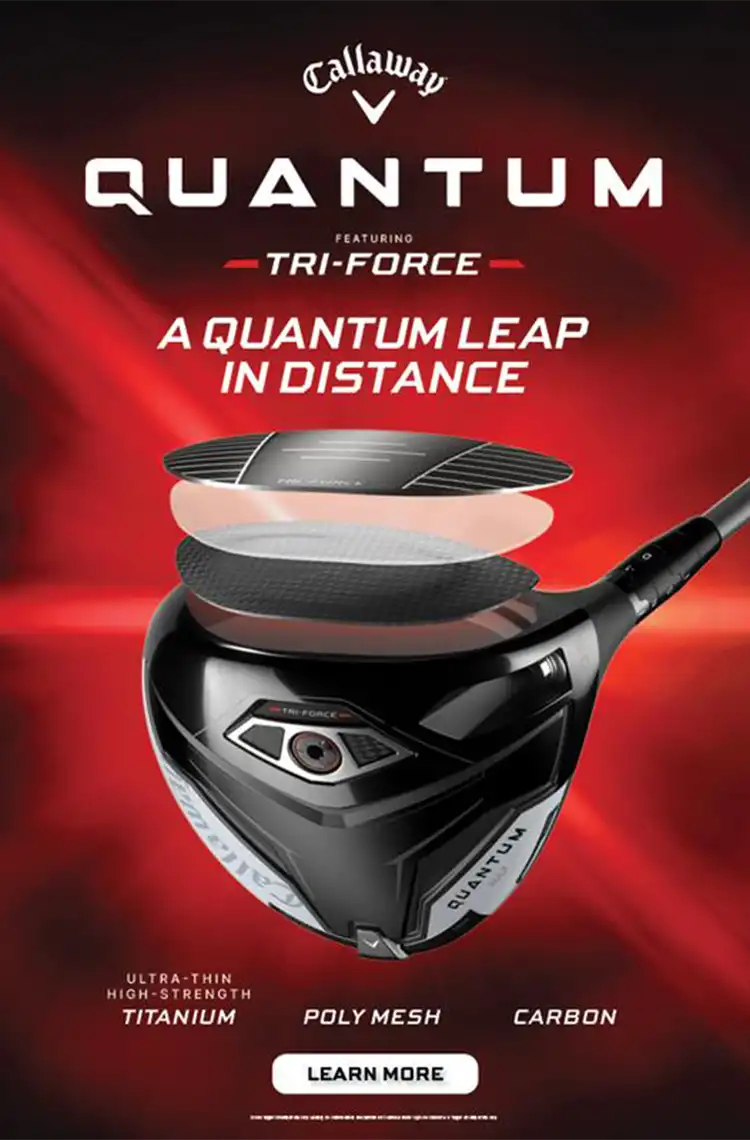Through trial, error, YouTube deep dives and plenty of laughs, LIV Golf star Lucas Herbert and caddie Nick Pugh have crafted one of golf’s best partnerships.
Nick Pugh is among golf’s most recognisable caddies, at least among active loopers on professional tours. How could you miss him? If you’re at a golf tournament, in a specialty coffee store somewhere in the world or a vintage golf shop in Korea, and you see a tall bloke, probably smiling and loving life, sporting a thick pair of coloured glasses, high-top sneakers from his formidable collection and completing the look with a luscious, white, bushranger beard that would likely be the envy of most men from Bendigo, Victoria, to Bozeman, Montana, it’s probably “Pughy”. The lad from the Wirral Peninsula near Liverpool might be the nicest guy you’ll meet, but he’s got the swagger of an Oasis band member blended effortlessly with the attention to detail of an 18th century explorer.
Pugh’s love for details and preparation, and his obsessive and curious side, are personality traits his boss, Australian golf star Lucas Herbert, likes to tease the Englishman about. “He’s either completely out or completely in,” Herbert, who’ll turn 30 during the second round of the Australian Open, laughs to Australian Golf Digest. “I’ll get to a practice round and say, ‘Alright, Pughy, what rabbit hole did you go down while researching last night?’ He’ll say, ‘I was watching this Hungarian bootmaker repair a pair of work shoes…’ And that’s the conversation for the day.”
It makes sense, considering that, while 50-year-old Pugh chats via phone, he notices a collection of artisan compasses in his lounge room: one each for the northern and southern hemispheres, plus a spare. “I’ll travel around the world with three different compasses,” Pugh says. “We’ll recalibrate them on the morning before each round.”
Pugh – who spends many of his off weeks in his base in Seoul, Korea, obsessing over his beloved espresso machine and hiking with his wife – almost laughs at himself while explaining how he dove deep into online forums about navigation and specialist orientation gear sites. He was searching for the “best compass you could probably circumnavigate your way around the planet with”.
“I’ve got one stuck to the front of my yardage book, and a reserve compass, and a Southern Hemisphere compass I bought in New Zealand,” Pugh says. “When you go to the Southern Hemisphere, the magnetic ball is different; the needle changes orientation, and the compass that worked in the Northern Hemisphere now starts to drag on the plastic, and it doesn’t rotate properly.”
That level of detail isn’t an eccentric side project. It’s how Pugh operates – an obsession with readiness, a refusal to let a single variable go unmeasured. “Pughy never wants to not have an answer to a question I ask on the course,” Herbert says. Adds Pugh: “Keeping the clubs clean, or having certain items in the golf bag, they’re not even 1 percenters; they’re fractions of a percent. But hopefully, they all add up, just at the right time, in the right place, for ‘Herbie’ to hit a shot he needs.”
For Bendigo-raised Herbert, that curiosity and depth – no matter how obscure the subject – is what grounds their partnership. That, and the fact it’s also a deep friendship.
“Off the course, he just treats me as a normal human being, and as simple as that sounds, it’s important,” Herbert says. “We don’t really talk much golf away from the course. We’ll just hang out. He’s an absolute coffee nerd, so he’ll sit there measuring grams of beans to grind to make his coffee. When you hear someone talking about something they’re really passionate about, it’s interesting to listen to regardless of the subject.”
Pugh the scientist and Herbert the artist is a dynamic that has yielded one of the most productive partnerships in world golf. Together, they’ve teamed up for four professional wins from Herbert’s six total. They’ve navigated the emotional turbulence of missed cuts and near-wins and found a rhythm along the way. But their connection was never guaranteed. It was built, fractured and refined through trial, error and trust.

THE MEETING
Their first interaction came by chance at the 2018 Singapore Open. Pugh was caddieing for Thai star Jazz Janewattananond and Herbert was making his first steps onto the international stage. “I became friends with Jazz through [former Asian Tour pro, Australian] Marcus Both,” Herbert recalls. “Jazz had Pughy caddieing for him and we played a practice round.” As it turned out, that week Herbert (T-8) and Janewattananond (T-4) qualified for the 2018 Open Championship at Carnoustie. There is still a picture in the clubhouse of the duo holding up the yellow Open Championship flags.
After Singapore, their paths kept crossing. Jazz was playing more on the DP World Tour and Herbert was frequently playing in Europe, too. By mid-2018, Herbert’s long-time coach, Dom Azzopardi, took notice of their banter and rapport. “Dom was always really impressed by Pughy’s work ethic,” Herbert recalls.
Pugh was loyal to an earlier commitment he’d made to caddie for Minkyu Kim for eight events. But by late 2018, Herbert and Pugh’s stars aligned. “We convinced Pughy to come and caddie at the Australian PGA in 2018 for me,” Herbert says. “That was our first event and we already had a bit of a friendship anyway, so it sort of naturally was easy to then have a working relationship. I played terrible, [shot 80], missed the cut, but I really enjoyed those two days with him. I said, ‘Do you want the job?’”

THE SPLIT
Their chemistry was undeniable. But as Herbert’s expectations rose, so did the pressure. By mid-2019, the partnership fractured. Aside from a T-7 at the Dubai Desert Classic, Herbert went almost nine months from late January to early September without a top-10 result, a stretch that included three missed cuts in a row.
“I went through a bit that year; I was struggling on the golf course, had very high expectations, wasn’t managing them well,” Herbert says. “Throughout the next 12 months, I went through a lot of personal development and understood better the idea of what makes people work and not work.”
Herbert held a training week for his entire team in Las Vegas in July 2019, where the team parted with Pugh. It boiled down to a perceived weakness in their different approaches to golf. Pugh recalls telling Herbert he was “a great kid” and a gifted player and that, down the track, perhaps it may work again.
But Herbert soon realised their differences were actually a strength. “I began to understand personalities and skill sets. I think it’s good to have different ways of looking at things and approaching them,” Herbert says.
Pugh remembers it as a necessary break. “When I first started working for Lucas, [my dedication to the raw numbers] was probably an area of my personality that almost kind of riled him,” Pugh recalls. “I’m like The Matrix, I walk on that tee box, I’m like, ‘OK, it’s this yardage, the flag plays downhill this much, the temperature is this, the ball’s going to go a bit farther. Lucas is the one that sees the shapes and the artistry.”
For Herbert, who won the Dubai Desert Classic in early 2020 before the COVID-19 pandemic, his hiatus from Pugh became a lesson in self-awareness. “Throughout the next 12 months I had a lot of personal development and understanding relationships,” he recalls. “I’m quite relaxed; I can miss a lot of finer details. Pughy is quite the opposite; very regimented, systematic, process-driven. We complement each other quite well.”
Once they’d reunited, there was an acceptance: Herbert was the artist and Pugh the scientist. The new dynamic worked, and Herbert went on to win the Irish Open in July 2021. Months later, he transitioned to the US where he gained his card on the PGA Tour through the Korn Ferry Tour Finals. Within months, he’d claimed a maiden PGA Tour victory at the Bermuda Championship.
“I got an apartment in the US and we pretty much ended up living together that year,” Herbert recalls of 2021. “We were already mates, but dealing with [the pandemic] and being away from family made us stronger. We won twice that year and celebrating together for not just wins, but birthdays and other stuff, made the friendship go to another level.”
It begs the question, how does this art-and-science approach play out on the golf course, from LIV Golf to majors and DP World Tour and Asian Tour events?
“When you get in the trees and there are three different options to try to hit the green, Pughy steps back because that’s my area; I’ll see what I see and I’ll figure it out,” Herbert explains. Pugh might occasionally try to steer whatever choice Herbert makes to a safer target, only by a metre or two. But ultimately it is Herbert’s choice. That balance can lead to a mindset that Pugh admired in 15-time major winner, Tiger Woods.
“What’s that saying Tiger had? ‘Aggressive swings to conservative targets,’ or something?” Pugh says. “Only sometimes will I step in, and even then, it’s more of a question of the decision. I might ask, ‘Do we need to hit that club? Do we need to get it that far down the fairway? Do you want to take on this shot or that?’ The questions are usually backed up with data and information. But I’m there to assist the artist, as opposed to instructing him to play golf my way, or any way other than how he feels comfortable.”
Pugh has occasionally intervened, or simply encouraged, Herbert’s artistic approach and there are three acute examples from recent victories. The first came during Herbert’s triumph at the 2021 Irish Open at Mount Juliet, just outside Kilkenny.
“When he won the Irish Open,” Pugh recalls, “we stood up on the 15th tee, which is a driveable par 4. Lucas had driven the ball horrendously all day. He looked at me, and he said, ‘Do you like the driver?’ and I said, ‘F–k yeah, I like the driver!’”
Herbert drove it greenside, got up-and-down for birdie and went on to win. “He actually said to me later that evening, ‘Your enthusiasm and confidence in me to hit driver on that hole was the turning point.’ That felt cool to hear.”
Two years later, at another DP World Tour event, the ISPS Handa Japan Championship, poor weather delayed Herbert’s flight out of his Florida base by several days. He was going to come in hot to the PMG Ishioka Golf Club, north-east of Tokyo. It was time for Pugh, who was in Japan on schedule with all his compasses, to step up to the plate.
“He didn’t arrive in Japan until the Wednesday night for a Thursday start,” Pugh recalls. “So it was quite a dream scenario for a caddie. He hadn’t seen the course, so I was saying things like, ‘OK, it’s a 3-wood at that tree in the distance,’ and he can’t really question your game plan. As the week progressed, we pretty much stayed to that exact same strategy… we navigated that golf course exactly how I’d planned it.”
Herbert eventually came from one shot behind starting the final day to win in a playoff. “I really enjoy the preparation side of golf; being on the golf course early in the morning, before anybody else, measuring fairway widths and double-checking numbers and doing my strategy stuff,” Pugh says.
That meticulousness gives Herbert the freedom to be himself. “We don’t really get angry at each other about work,” Herbert says. “We both know that we hold ourselves to a higher standard. The friendship becomes easy from there.”
The third example came during another win in Japan for Herbert earlier this year at the International Series Japan on the Asian Tour. At the Caledonian Golf Club in Chiba, Herbert, now a LIV Golf star on Cameron Smith’s Ripper GC squad, was in control early after a course record-equalling 62 on the first day. But late in the third round, he had regressed to five shots off the pace with three holes to play.
Herbert’s ball-striking and putting were sublime, but his expectations were outracing the inevitable ebb and flow of tournament golf. “I was hellbent, telling Pughy, ‘I’m going to win this by 10,’” Herbert recalls. “But I struggled in the third round. Pughy just got in my ear and said, ‘Mate, it’s not about if you’re going to win, it’s by how many – you’re that good. You’re going to beat these guys.’ And he just reinforced a bit of confidence to me and probably helped me get my head out of my ass a bit.”
Herbert then reeled off two stunning eagles in his last three holes that put him in a three-way tie for the lead after three rounds. A closing 64 was enough to seal the win, which included an eagle on the last hole. Not to mention the mere 23 putts he needed that final day, using a store-bought, brand new Yes! putter Pugh had found for his boss in a vintage golf shop in Korea the week prior.
When Herbert drained the closing eagle putt to win by five shots, Pugh leaned over and said, “See? It was a matter of how many.” It also prompted a now habitual celebration between the two, a reversal of the cover image for this issue: Pugh running to his boss and jumping onto him, wrapping his arms and legs around his good mate.

LIFE ON LIV
The move to LIV Golf in 2024 didn’t change their bond, rather it enhanced it. “If anything, Pughy was happy because it gave him more time to get the preparation in,” Herbert says.
In Ripper GC captain Smith, Herbert found a golfer who approaches putting and short game with a similar intensity. “It’s quite impressive to watch Lucas and Cam battling it out in practice rounds or during tournaments,” Pugh says of the pair. “You would think they would be exactly the same, but they are polar opposites. One’s very linear and one’s very visual. They read putts very differently. They have quite different strokes and mechanics. They are two of the best putters in the world, and it’s not just their natural, God-given talent; it’s mainly down to countless hours of hard work both put in. When you put them on the same team down the stretch, needing to hole putts, you would fancy the chances of Ripper GC coming out on top.”
Herbert says one of LIV’s benefits is the environment he’s in. He feels he is constantly learning while playing and practising among a team of golfers – Smith, Marc Leishman and Matt Jones – who boast multiple career wins across the PGA Tour, DP World Tour and LIV Golf. He’s also learning from their caddies.
“They are three great players and I get to observe and pick their brains because we’re teammates,” Herbert says. “You can see why the other boys’ caddie relationships work well; Matty Kelly [Leishman’s caddie] is concise and straight to the point with Leish. Working for Leish for 17 or 18 years, they have their communication perfected. Sam Pinfold [Smith’s caddie] is an incredible navigator, and he knows when to say something and what to say. He’s such a hard worker. And for Jonesy, [his looper] Lance is a great caddie, too. All four of them are willing to learn and try to figure out how they can get better.”
It’s paid off for Herbert. Since joining LIV, he says his game is far more well-rounded. He’s a better driver of the ball and iron player, while his short game and putting have become even more polished. In 2024, his first LIV season, Herbert had three top-10s late in the season to help Ripper GC into the teams finale. Once there, he contributed heavily to Ripper GC winning the overall, season-long team championship. He came back to Australia that summer and defeated Smith to win the NSW Open and then played his way into the final group at the Australian Open at Kingston Heath. In 2025, Herbert was flying for Ripper GC in the first half of the season, enjoying two top-four finishes before a T-2 at LIV Golf Mexico City. Then came the International Series win in Japan.
Herbert – who recently married his lovely bride Erika in an intimate ceremony in the US, where Pugh was the celebrant – has bigger plans for the 2025 Australian summer of golf and 2026 season.
He’s got his eyes fixed firmly on the Australian Open at Royal Melbourne; a course the Victorian knows intimately having played pennant golf on the Melbourne Sandbelt. He’s also hungry to contend in a major in 2026. The Australian Open, for the first time, will award the winner an automatic invitation to the 2026 Masters at Augusta National, as well as the annual three spots into the Open Championship from our national open, which is part of the Open Qualifying Series. “Having those opportunities to play majors next year is a nice reward for playing well, but I am so excited about playing the Australian Open in Melbourne again and especially at Royal Melbourne for the first time [since 1991],” Herbert says. “It is such a great golf course and tournament venue, and being right in the mix last year, I very much want to get the Stonehaven Cup in my hands, and I feel like I have a great chance this year. Contending at the Australian Open, and defending the NSW Open, would be the perfect way to end a pretty great year on and off the course for me. I’d also really love to be in contention at the pointy end of a major-championship Sunday.”
Herbert is not yet exempt into the four majors in 2026, although that could change quickly. Aside from the Australian Open, there’s also potential to win the PGA Tour of Australasia Order of Merit, which historically affords a spot in The Open and PGA Championship. There’s also a US Open and Open Championship spot via two points (May and June) on the LIV Golf points standings. Plus there’s last-minute final qualifying for both Opens. Herbert was successful in topping the leaderboard at the 36-hole qualifier at West Lancashire in July to get into the 153rd Open at Royal Portrush.
Next year’s Open Championship venue presents a big opportunity for team Herbert personally. Royal Birkdale, located in Southport on the north-west coast of England, is only 45 minutes north of the Wirral Peninsula, where Pugh grew up and became a club pro prior to caddieing. He knows the Birkdale links well and the 154th Open would have something of a home-game feel for Pugh.
Which brings us back to Pugh’s hard-working, Northern England mentality. Perhaps the soundtrack to his upbringing, which wasn’t far from Manchester, is the discography of that city’s most famous band: Oasis.
Coincidentally, Pugh reveals at the end of this phone call that he was hours away from attending Oasis’ Seoul leg of their global reunion tour. He also attended the Manchester band’s Cardiff show prior to The Open at Portrush. Naturally, I offer to Pugh that my favourite Oasis tune is “Acquiesce” and that plenty of its lyrics apply to he and Herbert. There’s the famous line in the chorus, “We believe in one another.” And then there’s the second verse, which begins, “There are many things that I would like to know, and there are many places that I wish to go, but everything’s dependent on the way the wind may blow.”
Well, not solely dependent. Pugh would argue compasses play a significant role.











